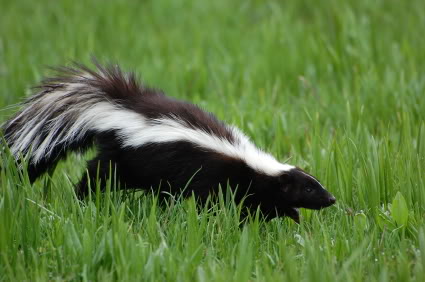Skunk Control

Watching cartoon skunks is fun. Passing real skunks on the highway is mildly annoying. Skunk control on your property is a frustrating hassle. Skunks eat trash, steal chickens, dig up the lawn and, of course, spray their foul odor. However, you can take skunk control steps to prevent nesting, minimize damage and clean up skunks’ stinky messes.
Blocking off Skunk Nests
Gaps under porches, sheds and decks are attractive skunk dens, so they should be sealed. First make sure nothing is living in those spaces. A trapped, dead skunk may be worse than a loose, live skunk. Then block entry. Fasten galvanized wire mesh to the exterior of the structure, and extend the mesh four inches down vertically, then one foot horizontally away from the wall. Also avoid leaving out piles of brush, debris and building materials. They could all provide skunk homes. For optimal skunk control, sweep up any nuts, fruits or berries that fall in the yard, and surround vegetable gardens, chicken coops and other skunk attractions with three feet of chicken wire, plus one foot of fencing buried underground. Skunks can dig, but they can’t climb.
Starving Skunks
Keep trash covered, and don’t leave pet food containers outside. Also keep grubs, or beetle larvae, out of the lawn. Skunks make three- to four-inch holes in the lawn while digging for grub snacks.
Keep grubs and skunks from destroying the turf by maintaining a well-watered, fertilized, healthy lawn. You can also help prevent grub infestations with insecticides containing clothianidin, imidacloprid or halofenozide; or with beneficial nematodes, which are microscopic, bug-killing worms.
Removing Stuck Skunks
Curious skunks are known for getting stuck in window wells. They may also panic and spray the window well. For window skunk control, cover window wells with plastic covers or metal grates. If a skunk is stuck, build an escape ramp or drop a trap baited with chicken, bacon or tuna. To avoid being sprayed, use shallow solid plastic skunk traps small enough to keep the skunk from fully raising its tail and releasing its spray. Also take care releasing skunks, as they may have distemper or rabies.
Odor Removal
Of course, even if you get rid of a skunk, it may leave behind its namesake defensive spray. Wash and ventilate any surfaces that may have been sprayed. Laundry detergent often rids clothes of skunk spray odors. For pet and human hair, you may need a more heavy-duty solution of 3-percent concentration hydrogen peroxide mixed with small amounts of baking soda and dish soap. The mix must be used immediately, as it might explode in a closed container. Take care not to splash the mixture in your eyes or mouth.
A variety of commercial products are available to mask or neutralize skunk spray. Two popular alternatives are Freshwave, a natural plant-based cleaner, and Epoleon, a powerful, concentrated chemical solution.
On the other hand, tomato juice doesn’t combat skunk odors. The rumored household remedy just briefly hides the smell.
You may not be able to keep all skunks off your property, but you can practice effective skunk control by stopping them from moving in - and you can get rid of their foul stench.
Looking for a Pro? Call us (866) 441-6648

Pest control Average Costs
Exterminators Experiences

Pest Control: Fast, Orderly Removal Of A Wasp Nest From Our Fence

Mouse Control Included Traps And Exclusion



